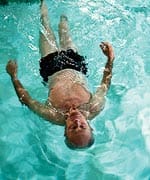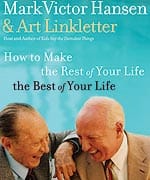Life Extension Magazine®
Although he is 94 years old, he acts like a 34-year-old, and he is aiming for 112, or even 120. He travels 150,000 miles a year, giving 75 or more lectures, and shows no signs of slowing down. He weighs the same as when he graduated from college. He has never smoked, does not drink, and has been married to the same woman for 70 years. In 2003, he received an Emmy Lifetime Achievement Award and a National Humanities Medal from the president, and he actively serves on the boards of many large corporations. In short, Art Linkletter is an ageless dynamo, a man with no plans for retirement, and living proof that the right diet, supplements, exercise, and attitude can propel you into a vigorous, productive, and fulfilling life well into your nineties and beyond. Despite a difficult start in life—he was abandoned by his parents, then adopted and raised by a poor, elderly couple—Linkletter discovered early on that he had a talent for talking to people. After that, everything just seemed to fall into place, leading to extraordinary success in both radio and television. A show business star for more than 60 years, Linkletter enjoyed record-breaking longevity with his shows, including “People Are Funny,” on NBC radio and television for 19 years, and “House Party,” on CBS radio and television for 25 years. His beloved book, Kids Say the Darndest Things, is one of the bestselling books in American publishing history. In fact, life has been so great for Linkletter that he has made a personal study of longevity, with the goal of living as long as possible. His latest book, How to Make the Rest of Your Life the Best of Your Life, written with Mark Victor Hansen (Nelson Books, 2006), is a comprehensive, inspiring anti-aging handbook, covering topics such as diet, exercise, creativity, sex, money, and stress, interspersed with worksheets and lots of witty jokes. Follow the authors’ formula and what they call your “Second Prime” of life will be more exciting than you ever imagined. A Personal Prescription for LongevityIn an exclusive interview with Life Extension, Linkletter reveals his personal prescription for a long and healthy life, including recommendations on food, supplements, physical activity, and maintaining a positive attitude. As he writes in his new book, “longevity is as much an act of will as a dedication to exercise and healthy diet.”
“I take very good care of myself,” Linkletter says. “I’ve never smoked, drank, or used any kind of drugs, except medical drugs when needed. I’ve been an athlete all my life and weigh the same now as when I got out of college, which is very important in this age of obesity. I’m very strong on eating fish, chicken, and fresh fruits and vegetables. I love a dessert, but I only eat half and eat it very slowly.” Linkletter is critical of how people eat these days, especially young people who down sugary drinks and snacks from vending machines. He is also deeply concerned about lack of exercise among the young, as children “become computer-mad and sit indoors all day, instead of being out playing ball or running.” From his early youth on, Linkletter has been an outstanding athlete, first honing his skills at the local YMCA in San Diego. A dedicated swimmer, he worked as a lifeguard up and down the California coast, was a Pacific Coast backstroke champion in swimming meets, and still swims today in his California backyard pool. “Swimming is a big part of my exercise program,” he explains, “and in many ways, it’s the best exercise for seniors, because it’s not an impact sport and doesn’t do any harm to your joints.” Linkletter was also an exceptional young gymnast, touring southern California with a gymnastic team and giving exhibitions on the parallel bars and trampoline. While in college at San Diego State University, he captained the basketball team and today is a member of the school’s basketball hall of fame. From the age of 25 until about the age of 50, he was one of the nation’s best four-wall handball players. “I played in the top 25 or 30 in the nation,” he says. “Handball is a very hard game, and I played about four times a week, including national tournaments.” Until this past year, Linkletter was also an avid skier who could often be found on the black diamond trails. Returning from a business trip, however, he discovered that his wife had given away his skiing equipment, explaining that she signed on to be a wife, not a nurse, and was afraid he might get into a collision on the crowded slopes. Today, Linkletter keeps fit with a daily exercise routine. “When I get up, I do some stretching, because when you get older, you need to stretch,” he says. “I also have two 10-pound weights I use for upper-body work. Then I ride on my stationary bike and watch the television news.”
Advice on Supplements and DrugsWhen it comes to supplements, Linkletter is a believer, though he claims he cannot compare to his pal Jack LaLanne (profiled in Life Extension in August, 2006). “We’re often on the same ship when I do lectures,” Linkletter says, laughing, “and Jack will just wrestle you down and try to put the vitamins right in your mouth!” In their book, Linkletter and Hansen strongly advocate the use of nutritional supplements, providing detailed information on vitamins, minerals, healthy oils, enzymes, amino acids, phytonutrients, antioxidants, and beneficial plant compounds. Their lists cover several pages and explore nutrients such as DHEA, omega-3 fatty acids, SAMe, vitamin K, resveratrol, and lycopene. Among their recommended “super foods” are sweet potatoes, watermelon, grape tomatoes, blueberries, and wild salmon. Linkletter also holds strong views on prescription medication. He says, “Doctors are often too quick to prescribe drugs for their patients, especially for emotional problems. With the high levels of stress that people face today, the frantic pace of life, and divorce and families breaking up, people rush to doctors and they put them on drugs that are not only addictive, but also destructive.” The solution? Doctors should spend more time with patients, get more information, and recommend over-the-counter solutions first. If prescription drugs are necessary, doctors should issue warnings about their side effects with long-term use. “I visit assisted living facilities quite often,” Linkletter explains, “and I listen to people talking. I often hear them say, ‘Oh, you have some of those little green pills with the red dots on them. I used to take those. Can I have a few?’ and they trade pills. Do you know what problems that can cause?” The Importance of a Positive AttitudeWhile a healthy diet, nutritional supplements, and exercise are three key components in Linkletter’s prescription for a long and healthy life, he has one more essential ingredient: a positive attitude. “You can’t change the color of your eyes or how tall you are, but you can change your attitude,” he says. “It may not be easy, but if you work at it, you can do it. Number one, don’t hug a tragedy to your bosom and mull it over, saying, ‘Why me, God?’ or ‘I don’t deserve this.’ I’d throw out all the ‘if onlys’ from my vocabulary because ‘if only’ is in the past. ‘If only I had done what my mother told me,’ ‘if only I had married someone else,’ and so on. Well, you did and it’s over, so put it behind you and deal with right now.” Over the years, Linkletter and his wife have experienced the tragic deaths of two of their five children and have seen serious illness strike a third. How did he manage to maintain a positive attitude in the face of such horrific, unexpected events? “If it’s a tragedy,” he says, “I grieve over it, I cry over it, I express my feelings without any shame or embarrassment. And then I put it behind me and think of the times that I loved that person and all the wonderful things we did together.” Linkletter adds that a sense of humor always helps. He says, “My wife and I have never had a serious quarrel, because I always end it with, ‘Honey, this is just a little disagreement, but now it’s becoming disagreeable.’ Then she laughs, because she realizes the argument is so ridiculous.” Linkletter also advises avoiding people he calls “catastrophizers,” or “people who can’t wait to tell you about the latest bad news.” Far better to seek out people with a lively sense of humor, whose company you can enjoy—which is exactly what Art has always done. Observing that “a living is what you get and a life is what you give,” Linkletter says that as you come to the later part of your life, remember to give back and find ways to help others. “There are people whom you love in your neighborhood, in your family, in your religious organization, at your job. Don’t miss any opportunity to tell them not only that you love them, but also why and how you love them.”
Linkletter believes that longevity is 70-75% lifestyle and 25-30% genes. After years of studying the literature on longevity, he believes that under the right circumstances, people today can live to about 120. He notes there are about 73,000 people who have reached the century mark, but only one of every five is a man. Since the biggest threat at that age is falling down and breaking a hip, Linkletter is determined to maintain his sense of balance and strength in his arms and legs. “I’ve been so lucky,” he says, “and I’ve worked so hard and it all worked out so well. I really haven’t missed anything. That’s why I’m not worried about death. But I’m not anxious to leave. I wake up every morning and say, ‘Well, here’s another day and I’m ready to get going.’” To make sure he joins the “century club,” Linkletter has taken a special precaution: he’s booked a paid speaking engagement in Washington, DC, on July 17, 2012—his 100th birthday. He adds with a laugh, “I figure I’m not going to die if I have a contract.” The way Art Linkletter is going now, maybe he should book his 120th birthday as well. For more information on Art Linkletter, his new book, and the “Second Prime” of life, please visit www.secondprime.com, a new website devoted to the unique needs and interests of people over 50. |




